
Booking It (Vol. 2)
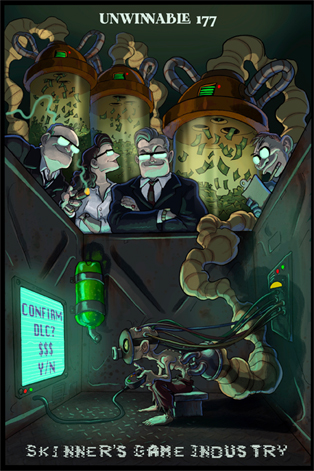
This column is a reprint from Unwinnable Monthly #177. If you like what you see, grab the magazine for less than ten dollars, or subscribe and get all future magazines for half price.
———
Interfacing in the millennium.
———
Welcome back to part two of my International Booker Prize 2024 read-through! I struggled with this one, guys, not going to lie. Great books, but a lot of them, including one I had to actually order from the publisher in the UK because I couldn’t find a US source for it, were dense reads that it took me a while to get through. That being said, the luck of the draw means that this group of books was overall much more successful than the first – no duds, a couple I found interesting but perhaps executed confusingly and a few real gems.
We’re back to our favorite theme of intimate personal relationships anchored heavily in internal description and the exploration of intricate webs of relationships with Jenny Erpenbeck’s Kairos, Ia Genberg’s The Details, Rodrigo Blanco Calderón’s Simpatía and Hwang Sok-yong’s Mater 2-10. We once again explore dictatorship, occupation and oppressive systems in Kairos, Mater 2-10 and Ismail Kadare’s A Dictator Calls. And we touch the thin lines between death and life in Urszula Honek’s White Nights, Selva Almada’s Not a River, Simpatía and Mater 2-10 (really the jack-of-all-trades of this list!) I found the writing in this group stronger, in general, than the last group, but had a few more structural issues, or places where I felt like I wasn’t entirely following the author’s intent.
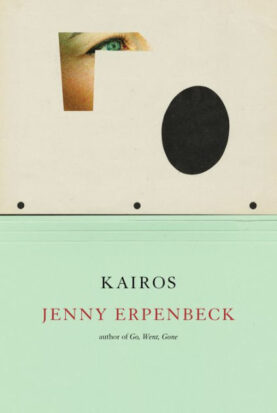
Erpenbeck’s Kairos ended up winning, and I can’t say I disagree – I have a hard time arguing with its craft and breadth of emotion. What made the book interesting to me was the granularity with which it focused on the relationship between Katharina and Hans. Everything is seen through the lens of their interactions with each other, up to and including the political boundaries between East and West Germany and the subsequent dissolution of the states. On one hand, it was a compellingly unsubtle metaphor for the complexity of the world dissolving itself into intimate relationships, the great things happening around people experiencing acute feelings that are in those moments unbeknownst to them. On the other hand . . . well. Katharina is a frustrating character, and Hans is just awful, and a lot of the book is ambient, aimless misery. Earlier on, the descriptions of lovesickness hit uncomfortably close to home, that entrancing rush of wanting and being wanted, but as the book went on, I felt that sympathy sharply drop away. I could feel myself draw a line at what I could perceive as love, even as the book used all its beautiful language and rhetorical tricks to try to coax me over it. Quite an interesting experience, and definitely a worthwhile read, but one that left a sour taste in my mouth.
Topically similar is Ia Genberg’s The Details, which doesn’t shake out to much more than a list of people who have been important to the narrator, from friends to lovers to family. It felt more bite-sized than anything in this list, though Not a River perhaps beats it strictly with page count, because it was so limited in scope – there was no apprehension of plot, no attempt to do a structure beyond the obvious, and no significant outer framing device. Despite this, I found it incredibly affecting, and I would say the writing is some of the strongest in this list of books. Genberg’s interiority is unmatched by anyone beyond Erpenbeck and Starnone, and though the roster of characters she shuffles through tend towards the Rooney-esque, she gives them an inner life, tics and interactions with her narrator that make them feel vividly real. The Details touches on some hard topics – asymmetrical relationships, glimpses of abuse – but I came out of it feeling much kinder than after Kairos. Its definition of love felt expansive and generous, rooted in the real chronology of life as opposed to Kairos‘ single-minded focus.
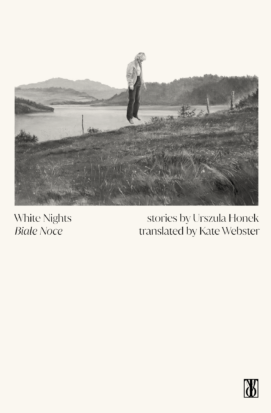
Urszula Honek’s White Nights is another European novel rooted in personal relationships, exploring intimacy and human relations, but I have trouble even equating it with The Details and Kairos because of how brutal it was. Nothing crueler happens in these stories than in the other books in this series, but for whatever reason they were harder to get through and less easy to recover from. The shifting perspectives affected this some, with one of the strongest and most nauseating transitions being from a third-person narrative of the evening a girl finds her grandmother dead, to an almost-stream of consciousness monologue from the same girl’s absent mother describing the circumstances under which she left her child. I don’t know if I had the stomach to fully appreciate these admittedly beautiful and technically capable stories. Not Honek’s fault, of course; it’s just like that sometimes.
White Nights also reminded me, strangely enough, of a very different book from this list, Almada’s Not a River. Set in a rural island community in northern Argentina, the landscape and environmental relationships felt in conversation with Honek’s village in southern Poland. Both books hinge on the exposed, incestuous nature of small communities in rural areas, and both books trade in brief and startling moments of violence. Not a River, however, felt much more balanced, and the writing was precise and Faulknerian, impressive especially because of the quality of the translation. The translator’s note at the end of the book was fascinating, and I appreciated learning about the care and specificity that goes into translating Almada’s writing, especially particulars of region and dialect that I might have noticed subconsciously while reading but could not have put words to. This was another short but beautiful read, and I think my personal favorite on a sentence level.
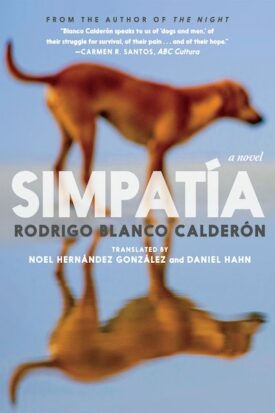
The other Latin American book from this group was Calderón’s Simpatía, a fairly confusing book. I followed the theme of the dogs, which I understood as representing selfless and unconditional love as opposed to the fickle, occasionally violent human characters. However, the story winds around itself, often feeling like it was approaching some sort of alternate tone that it never quite made it towards. Ulises as a protagonist is fairly passive, quiet and internal, and his relationship with Martín and subsequent founding of the Perros organization form a bastion of calm against the uncertainty and violence of day-to-day life in urban Venezuela – a theme that occurs in many of these books – and as such the strange moments of darkness do seem like a reminder that the world exists outside of the ship on top of the mountain where Ulises attempts to barricade himself. But I still felt like I didn’t fully understand what the book was trying to do, and I would love to hear more about it from someone who Got It.
Violent social structures and unpredictable governments are continued in Ismail Kadare’s A Dictator Calls. I enjoyed Kadare’s book more at the beginning than at the end. The frame story, in which the narrator describes a brief call received from Enver Hoxha that became a turning point in his life, was a strong hook, and I was fascinated by how it then wove itself in with the narrator’s obsession with a similar call from Stalin to Boris Pasternak that led to his eventual exile. The idea of a life and career balancing on the handful of sentences one might have said in an unplanned conversation on an insignificant day in the middle of their lives is unique and intoxicating, and I read the majority of the book in one sitting. However, it disappointed me by never returning to this frame story. The narrative goes through dozens of possible versions of Stalin’s call with Pasternak – citations included, doing well to advance its tendencies towards obsession and the self-evident association of the narrator with Pasternak himself – but then it runs out of new possibilities and just . . . ends. I found myself wanting more, I think; I felt as if he had run out of possibilities right as I was beginning to find them.
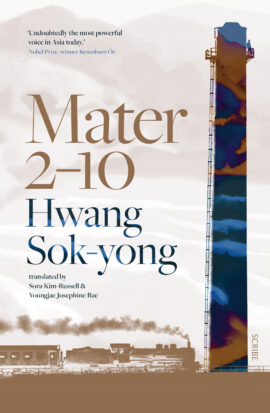
I am rounding out my list with the densest possible book, and again perhaps the most impressive. Hwang Sok-yong’s Mater 2-10 is in many ways a similar endeavor to Domenico Starnone’s The House on Via Gemito, and effective for similar reasons. But while Via Gemito felt like an exercise in style and was almost claustrophobic in its focus, Mater 2-10‘s fingers stretch out from its starting point of a modern-day railroad worker in the middle of a months-long sit-in and reach widely and expansively through time, pulling itself back and back through his family history and concurrently the Korean experience under Japanese occupation in the early 20th century. While obviously a family saga, the way it dealt with its environment and political history felt akin to Kadare’s Albania in The Dictator Calls or Katharina and Hans’ East Germany in Kairos. All of these books concern themselves with how individual lives affect and are affected by the societies they exist within, from the personal to the professional to the explicitly political. The book is almost 500 pages, and it takes its leisurely time. While Via Gemito used that page count to get intimate with one character, Mater 2-10 wanders in and out of four generations of family. It’s entrancing, a proper saga, helped rather than hindered by its practical writing style and disregard for chronology.
This has been an interesting experiment. I’m not surprised by the general tendencies of the Booker committee towards a certain type of story, and the outliers tend to be more interesting than the ones that fall immediately in line with the urban European semi-bourgeois thinker’s novel. But coming from modern English-language American literature, which is often allergic to sincerity and desperate for a film adaptation, I still found the majority of these books to be fascinating. Navel-gazing can be satisfying! The human experience is universal! The relationship in Kairos was awful but I was still kinda like yeah girl it be like that sometimes!
I will keep reading more translated lit. That’s the goal. Hope you guys are reading good books out there. Keep up the good work.
———
Maddi Chilton is an internet artifact from St. Louis, Missouri. Follow her on Twitter @allpalaces.




